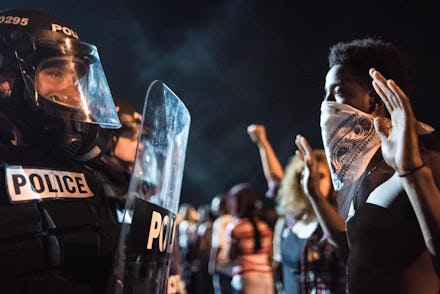White Americans appear to have finally woken up to the mistreatment of Black people, poll finds

Since the beginning of summer, protesters have taken to the streets to demonstrate against anti-Black racism in the United States. The protests have resulted in vicious crackdowns from local law enforcement and federal agents being deployed in cities like Portland. With that in mind, it's hardly a surprise that a recent poll found that satisfaction with the treatment of Black people in the U.S. is at an all-time low.
Between June 8 and July 24, Gallup surveyed 1,226 U.S. adults about the treatment of Black people in the country. Gallup's poll had an oversample of Black adults and a margin error of four percentage points. Still, the poll found that only 35% of respondents said they're satisfied with the country's treatment of Black people. Not only is this a 9-point drop since the question was last asked two years ago, but it's also the lowest percentage since Gallup began measuring the trend in 2001.
Of course, Gallup found that people's viewpoints are "sharply polarized" depending on their race. White people reported being about twice as satisfied about the treatment of Black people in the U.S. as Black people themselves, at 41% and 21% respectively. However, the overall decrease in satisfaction is due to changing perceptions among white Americans, as their reported satisfaction dropped by 10 points since 2018.
Generally, Black people haven't been satisfied with their treatment even before this summer. That makes sense. Because while narratives often paint President Trump and his administration as uniquely terrible, Black people have suffered under every single administration. The movement for Black lives precedes Trump, after all, having ignited under President Barack Obama following the death of Michael Brown in Ferguson, Missouri, in 2014. Even before that, it was President Bill Clinton's administration that passed the infamous 1994 crime bill that bred our culture of mass incarceration.
That particular bill has come back to haunt the Democratic Party more than ever now. Because while Democrats are trying to appeal to Black voters ahead of the 2020 presidential election, many express hesitancy at feeling expected to vote for presumed Democratic presidential candidate Joe Biden, who helped author the bill.
While protests around defunding and abolishing police are obvious factors in the poll's results, the coronavirus pandemic's impact shouldn't be downplayed, either. Black communities have been among the hardest hit by the pandemic, suffering disproportionately from food insecurity, mass evictions, and more.